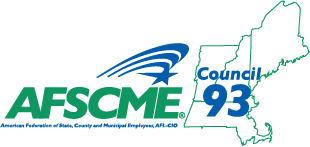From Socialistworker.org
April 15, 2014
The Socialist - John Chambers reports from Burlington on a battle involving union workers and their supporters at one of the largest employers in the state of Vermont.
The Howard Center in Burlington, VT
LAST YEAR, representatives of AFSCME Council 93 successfully pushed for state legislation in Vermont to appropriate additional funds for a small but much-needed 3 percent wage increase for direct-care service providers at the Howard Center, the state's largest human services organization, with programs ranging from crisis and counseling services to support for individuals with disabilities.
The funds were transferred to the Howard Center on November 1 of last year--but none of the money found its way to Howard Center employees. Last month, in an effort to pressure Howard Center to honor its legal obligation, AFSCME filed a lawsuit.
But the union isn't relying only on legal maneuvers to win this battle. On April 8, more than 60 Howard Center workers and community supporters attended the organization's board of directors meeting to ask: "Where's our 3 percent raise?"
Direct-care providers who spoke at the meeting didn't limit their statements to the issue of the wage increase, either. They took the opportunity to voice longstanding grievances about poverty wages for a highly skilled workforce--many of the positions for direct-care providers require a master's degrees--and unsustainable workloads.
Alison Seager, a social worker at the Howard Center for 16 years, said, "I'm an advocate for children and families, but now I need to advocate for myself." Despite her long career at the Howard Center, Alison makes only $41,000 a year--just $6,000 over where she started 16 years ago. As a result, last winter, she and her three children had to wear extra clothing because she couldn't afford to pay a big heating bill.
Alison's situation isn't unique. She went on to share stories about colleagues living paycheck to paycheck, with some of them on food stamps. "We take our clients to food shelves, and then we have to go there," Seager said.
Beth Jacobs, an employee at the Howard Center for the past year, echoed this sentiment: "We want to inspire people to improve their lives, but we're drowning in our own caseloads."
The combination of low wages and ever-increasing workloads has led to an alarmingly high turnover rate. According to Connie Norona, a caseworker in the opium addiction clinic, "Upper-level management is in a 'punishment' mindset, with unrealistic expectations about caseloads and paperwork...People are working on their days off and during lunch hours because of the workload."
- - - - - - - - - - - - - - - -
WITH MORE than 1,000 employees, HowardCenter is one of the largest employers in the state of Vermont. Over 95 percent of its funding comes from the state and grants.
According to Jim Durkin, assistant director of legislation for AFSCME Council 93, the current dispute stems from a dispute about the previously agreed to wage increase.
In 2011, the union negotiated a 1.6 percent wage increase for direct-care providers, to go into effect on July 1, 2013.
The board of directors wants to make this 1.6 percent hike a part of the 3 percent raise guaranteed to workers in the state legislation. This means the Howard Center would essentially be "pocketing" more than half of the taxpayer funds appropriated explicitly for the direct-care providers.
The fight for increased wages coincides with a longer-term strategy by AFSCME to increase the size and strength of its union locals at Howard Center.
Howard Center workers unionized back in 1994. However, due to its status as an open shop, the high turnover rate among employees and inadequate resources, the union was small and relatively ineffective. In fact, many employees at Howard Center are only just now learning that they have a union.
Recently, however, AFSCME began putting resources into building up Council 93. These organizing efforts have been met with significant resistance from HowardCenter management. Union organizers have been have been kicked off Howard Center parking lots. Unable to talk with employees at work, organizers took to going door to door in order to talk to workers.
Recently, Todd Centybear, the executive director at Howard Center, and Loraine Jenny, the head of Human Resources, each sent out e-mails portraying AFSCME organizers as out-of-state troublemakers attempting to bully employees into joining the union. In response, AFSCME filed an unfair labor practice complaint against the center.
Despite management's attempts to marginalize and discredit the union, its efforts have been largely unsuccessful. In just a few months, the union has tripled in size from roughly 60 to 180 members.
The growth in the size and strength of AFSCME Council 93 and the recent victory of the Chittenden County Transportation Authority bus drivers' strike are signs of growing militancy among Burlington's working class. Just like the bus drivers, direct-care service providers are taking a stand for livable jobs.
Be sure to check out AFSCME Local 1674's Facebook Page, and click the 'Like' button to receive periodic updates from them!
